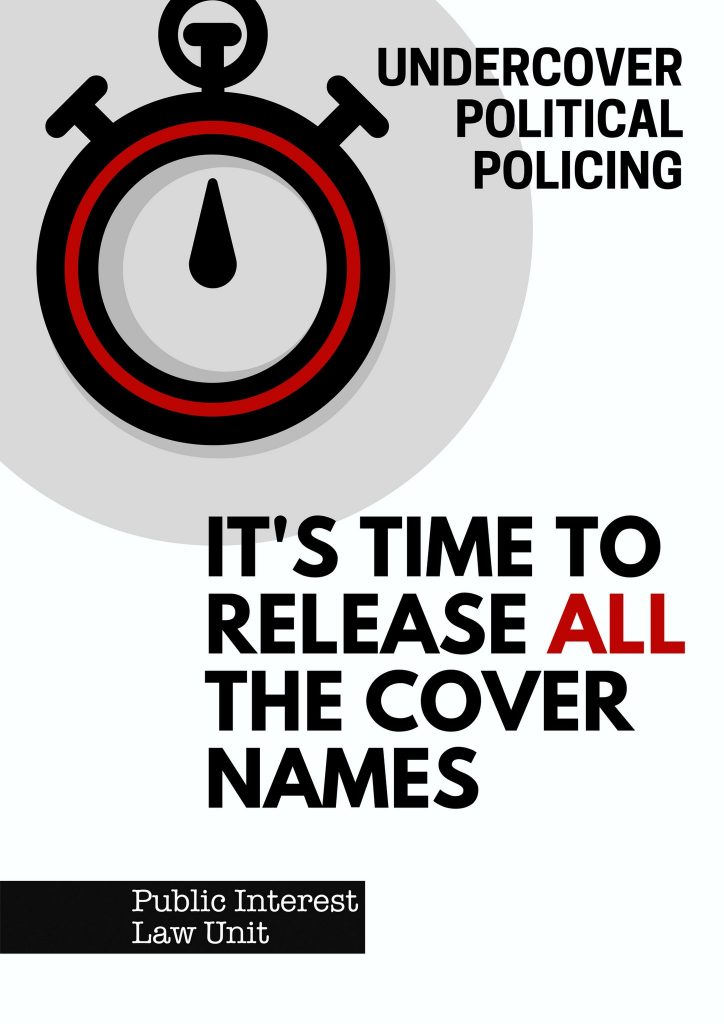
Being hit by the news that your friend, lover or comrade was an undercover officer can be shattering, yet it is through this news that the spycops scandal broke and we have become aware of the appalling abuses committed by these officers and the units behind them.
Only one third of undercover officers have been named by the Public Inquiry. It is thought there have been over 200 operating since the SDS was set up. Each officer had a cover name they used while undercover, and it is these we are demanding that the Inquiry release, so that the people affected can give their evidence to the Inquiry, and the true extent of this scandal is exposed. The Inquiry has released confirmed the names of a handful of officers so far, and most were ones already identified by campaigners.
Why must the cover names be released?
“The five years that have passed since the exposure of the first undercover officers have seen an avalanche of revelations about the abusive and sometimes illegal activities of Britain’s secret police; and this information, uncovered by activists, journalists and whistleblowers, is just the tip of the iceberg. Around 200 undercover officers are known to have been used to infiltrate political movements in Britain since 1968, affecting potentially thousands of groups and individuals who have no idea that their companions, friends, partners, or even fathers were, in fact, police spies.
The lessons from Germany during the fall of the GDR are clear: legal processes, courts, and government inquiries alone cannot be trusted to uncover the truth. It took direct action and pressure from the grassroots to forcibly expose the abuses of the Stasi. Today…. we remember the bravery and conviction of the people of the GDR; and to the police and the Pitchford Inquiry we have this message: enough is enough, it is time to release the cover names and open the files.” Statement made by eight women suing the police over relationships with undercover officers.
In a letter to Lord Pitchford, 133 non police, non state core participants requested that in order to be successful, the Undercover Policing Inquiry must release a list of names of all the organisations about whom intelligence was gathered and the cover names (not the real identities) of the individual officers responsible for infiltrating and reporting on activists and campaigns. Without this basic information, it is impossible for the Inquiry to have a full picture of undercover policing.
The only people currently able to contribute to the Inquiry are those that who have already themselves researched and revealed the existence of undercover officers, or those who have been informed by the media they had been subject to covert surveillance. This means the overwhelming majority of individuals and organisations targeted since 1968 have had no opportunity to consider the possible consequences of the actions of undercover officers and cannot currently participate in the Inquiry. By their own admission, police records were patchy and much of what was documented has subsequently been lost or destroyed.
Even without the resistance to genuine openness and transparency we are experiencing, it is plain the police alone cannot provide an adequate narrative of their actions. The only way to discover a true picture of the impact of their undercover operations is to hear the testimony of those about whom intelligence has been gathered.
The process for their release
Though it is a Public Inquiry, the presiding judge has power to restrict attendance at hearings and the release of some evidence. These are known as ‘Restriction Orders’. Applying for restriction orders on cover names is a police tactic to prevent the public from learning information. The Inquiry’s original judge Lord Pitchford made a ruling on the approach he would take to restriction orders and anonymity (see progress briefing 1). His ruling was tentatively promising, recognising the chilling effect not releasing cover names would have on the Inquiry. However, the balancing exercise for each application for a restriction order undertaken by his successor Sir John Mitting has been strongly weighted in favour of police secrecy.
The police used deliberate delaying tactics in requests for anonymity orders which has meant further delays to the inquiry, including applying for restriction orders for almost all the officers and many back office staff and supervising officers. They claim that there is a risk that officers will be harmed if their cover names are released, despite there being no evidence of that. Anonymity has been granted to two thirds of officers who requested it.

